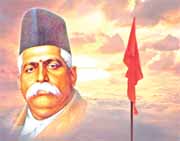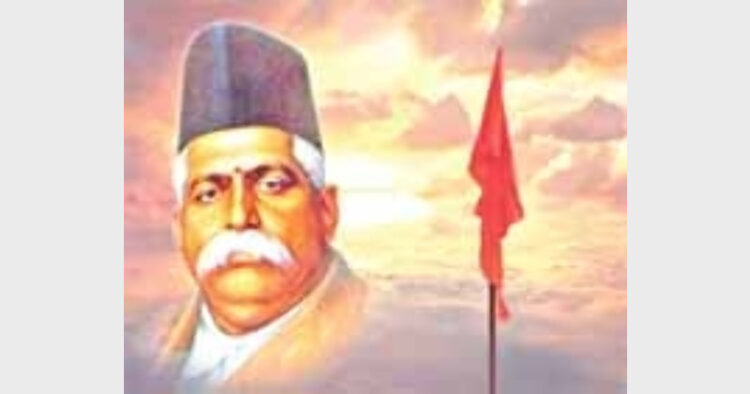 In the first half of the 20th century, the role of the Rashtriya Swayamsevak Sangh in the cultural and national awakening was unparalleled. Its founder, Dr. Keshav Rao Baliram Hedgewar pointed the lack of discipline, patriotic fervour and absence of Hindu solidarity as the main reasons for Bharat’s subservience, and stressed that the Sangh would eradicate these evils prevalent in the society. It is gratifying to note that the Sangh is successfully achieving its objects and has now become one of the biggest organisation of the world.
In the first half of the 20th century, the role of the Rashtriya Swayamsevak Sangh in the cultural and national awakening was unparalleled. Its founder, Dr. Keshav Rao Baliram Hedgewar pointed the lack of discipline, patriotic fervour and absence of Hindu solidarity as the main reasons for Bharat’s subservience, and stressed that the Sangh would eradicate these evils prevalent in the society. It is gratifying to note that the Sangh is successfully achieving its objects and has now become one of the biggest organisation of the world.
From 1858 to 1947 British established a direct rule over Bharat. From the very beginning, their mode of operation has been ‘Divide and Rule’. They reduced the number of the Bharateeyas in the Army. Queen Victoria made empty promises to win the confidence of the Bharateeyas. They exploited Bharateeyas socially and economically. They acquired our wealth in plenty. Not only this; they abolished Gram Panchayats and rural communities and in the process crushed their self-dependence. They commercialised farming and destroyed cottage industries. They dismantled traditional Bharateeya systems and replaced them with Zamindari, Raiyatwari and Mahalwari systems. Consequently there was a rise in unemployment, hunger and poverty. There were famines from time to time and several lakh people died.
Simultaneously they also encouraged religious bitterness amongst people and spread rumours about our history. They also made all efforts to make the Bharateeyas think lowly of themselves. They always considered Bharat as a continent or a subcontinent, but never a big country for that matter. They even went so far as to say that Bharat is no country and didn’t have a nationality. But, we must remember that in Bharat it was never about ‘Political Nationality’ as much as it was about ‘Cultural Nationalism’, which could not be contained even by the great fight of 1857.
With the advent of the great Freedom Struggle in 1857, came cultural awakening and a revival of nationalism. Some of the proponents of this awakening were Swami Dayanand, Swami Vivekananda, Bankim Chandra Chattopadhyay, Maharishi Aurobindo, Lokmanya Tilak, Lala Lajpat Rai, Madan Mohan Malviya, Rabindranath Tagore, Dr. Bhimrao Ambedkar, Mahatma Jyotiba Phule, Dr. Keshavrao Baliram Hedgewar and Mahatma Gandhi who for the next 90 years (1858-1947) inspired Bharateeyas with a sense of glory and pride with the help of religion, culture, spiritualism and virtues. For Instance, Swami Dayanand announced that ‘India is for Indians’. Swami Vivekananda, at the Parliament of World Religions in Chicago, spoke about the excellence and grandeur of Hindutva. He established religion as the ‘soul of India.’ Bankim Chandra Chattopadhyay in his creation, Anandamath wrote Vande Mataram which became the motto of nationalism in the years to come. Maharishi Aurobindo professed –‘Nationalism is not politics. It is a religion, a faith, a loyalty’ and thus imbibed a sense of political awakening amongst Bharateeyas. Lokmanya Tilak preached ‘Swaraj is my birth right’. Dr. Ambedkar re-emphasised that a nation is not born in a day. It is the result of efforts made by several generations. Mahatma Gandhi upheld Hinduism as the most tolerant of all religions. Reform Movements like the Arya Samaj, Brahm Samaj, Satya-Shodhak Samaj, Theosophical Society, Shri Narayana Paripalan Yogam, Singh Sabha, Sanatan Dharma contributed to a great deal in this cultural reformThe revolutionists had a remarkable role to play in India’s freedom movement. Apart from few exceptions, these revolutionists were filled with a sense of Hindutva. They were neither violent nor extremists. Their struggle continued from Kuka Movement till the time of Udham Singh. The most notable among them were the sacrifice of Vasudev Balwant Phadke, Manipur Movement under the leadership of Tikendra Jeet Singh, Birsa Munda Movement in Ranchi, the sacrifice of the Chapekar Brothers, the torture inflicted upon Veer Savarkar, and the sacrifice of Sardar Ajit Singh, Sardar Kartar Singh, Sardar Bhagat Singh, Sukhdev and Rajguru. Who can forget the Chittagong armoury raid, the sacrifice of Queen Gaidinliu and Yadunag and Udham Singh. Quite a few amongst these like Madanlal Dhingra, Lala Hardyal and many members of the Ghadar Party went to foreign lands for our freedom. The role of Subhas Chandra Bose and his Indian National Army was unparalleled.
Dr Satish Chandra Mittal (The writer is Professor ( Retd.), History Department, Kurukshetra University,Kurukshetra) ( To be concluded )














Comments